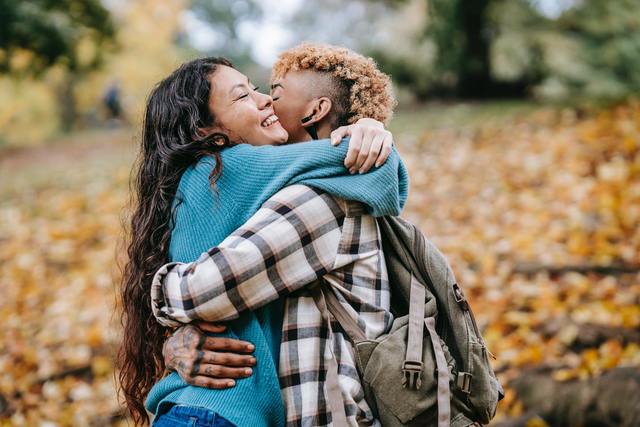Article
How Can I Be Supportive?

Tips for communication with cancer patients
It can be difficult to find out that someone you know has cancer and you’re not alone if you don’t know what to say in certain situations or when first finding out.
You might not know the person very well but want to show you care. Or you have a close relationship and feel scared and uncertain.
Whatever it is, here are some tips on what to keep in mind when communicating with a cancer patient:
DO:
1. Take your time to process
In the beginning you might need some time to deal with your own feelings. This is valid. Do some research and get familiar with the topic by looking for reliable sources or talking to a professional.
2. Show you care
Whether it is a visit, a call or a text – it’s the small gestures that show you care. Let them know you are there for them by showing your interest, encouragement and support, not just once but regularly.
Here are some ideas on what to say:
- "How are you doing?"
- "I'm not sure what to say, but I want you to know I care".
- "I'm sorry to hear that you are going through this".
- "If you would like to talk about it, please know that I'm here and happy to listen".
- “If you don’t feel like talking right now, that’s OK, too. I’m happy to listen whenever you’re ready.
- "Please let me know how I can help".
- "I'll keep you in my thoughts".
3. Listen
Sometimes listening is the best thing you can do. Give them the space to speak about whatever they want and don’t judge or try to change how they feel. If they are asking for advice, respond in an honest and heartfelt way but otherwise just listen and allow them to share the unpleasant thoughts they might have.
4. Connect them with a community
Help them look for support groups or connect them with a community, if they are interested. This may take the stress of searching for the right group away from them.
5. Go to their (chemo) therapy with them
It can be quite lonely going to an appointment alone in a possibly stressful environment. Offer your support by accompanying them.
6. Laugh with them
Laughing and joking around is a great way to relieve stress. But make sure the situation is appropriate and the other person can handle it.
DON’T:
1. Speculate the cause
Telling those affected your speculation on why they got cancer or asking them if they did things in the past that might have caused their cancer can affect them deeply. You don’t want them to feel depressed and blame themselves for their cancer.
2. Say “I know how you feel.”
No one can know exactly how another person feels, especially when they have cancer.
3. Use empty phrases
Being encouraging is important but empty phrases like “Keep your head up.”, “You’ll be fine.” or “Just stay positive.” have little meaning and can feel as if you are ignoring the other person's fears and concerns.
4. Tell them about that aunt/friend/colleague you know who also has/had cancer
Everyone is different and what might have worked for some, might not work for others. Comparing people’s cancer stories can be discouraging or give false hopes.
5. Make comments about their appearance when they don’t look good
“You’re pale,” or “You’ve lost weight.” won’t make them feel better and just put more attention on these negative aspects. Instead, let them know when they look good!
Voices of Young Cancer Survivors:
I felt the most support when...
- I received support from my parents who were close to me from the first moment and always are, and from some friends who saw my difficulties and continued to look for me despite me being at home for a long time without being able to go out. I received support from my family, my grandmother and my uncles who showed me love every day. I remember that in March, after the second surgery, I turned 20 and my uncles organized a surprise party for me. I was too excited, I was sad, happy, angry because I had severe pain but seeing my loved ones gathered to celebrate my birthday gave me joy and I cried a lot.
- A great support was given to me by a dear friend of mine whom I met in the hospital. He shook my hand, virtually, every day, made me feel his daily presence with messages, phone calls and video calls. He encouraged me telling me that everything would end soon and that we would make it.
- I found help and support from my friend Samantha who always accompanied me to the hospital when I did chemo, she never left me alone.
- A spark sparked in me and gave me strength, when my three-year-old daughter saw me without hair and said: "Mom, but you are beautiful!"
When did you feel hurt by others? What could you not stand? - I was hurt by so many people I thought were my friends and then moved away from me at that time. I was hurt in particular by a person who criticized my behavior, in fact I love taking pictures and being photographed. He criticized me for often taking pictures of myself and posting them because he was convinced that I did it to be a victim, while for me it has always been my way of speaking and showing myself to the world.
- I couldn't stand when they came to visit me at home and although I was lying on a couch without being able to move, they complained about their headaches and trivial things in life.
- I felt hurt when a "former friend" of mine called me telling me that she was very sick that day, and had a simple herpes on her lips, and I had chemo that day; I felt hurt when many met me and said: ah, don’t worry hair will grow again, be serene; I felt hurt when many told me: "hair and trouble never fail";
- Often, especially during therapy I felt hurt, but more than anything else I felt misunderstood in the sensations I felt, in the conflicting emotions I felt. Only those who face this path can actually understand.
- I couldn't stand when someone touched my hairless head; I couldn't stand when someone looked at me as a "sick person"; I could not stand and I can't stand when I tell my story and those who listen to me think they have faced worse things than mine, competing to see who has been more bad. I think that everything we face lacerates our soul, it is not a race to who is or has been more bad. I could not stand and I can't stand when someone, as soon as he meets me, lowers his gaze and looks at my breasts to see if I have had a mastectomy and if my breasts have been reconstructed.
This article was developed through conversations with cancer patients as part of the OACCUs project. Additional sources were the American Cancer Society and Caringbridge.
Author: Nicole Stiegeler, OAC
